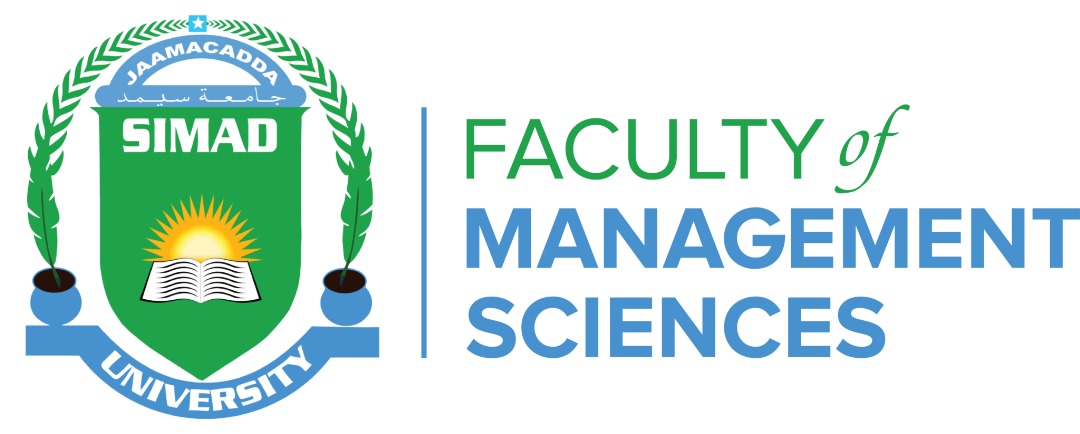Entrepreneurship and Innovation
Introduction
Entrepreneurship and innovation is vital because it has the potential to raise living standards and generate money, not just for entrepreneurs but also for connected firms. Entrepreneurs also contribute to change through innovation, as new and improved goods create new markets. Also, entrepreneurship and innovation, if successfully managed, has the potential to enhance the continent’s middle class, which is critical to sustaining economic progress. To prepare Somali youth for the future, entrepreneurial training should be included into formal education.
Program Goals
The bachelor program in business Administration with concentration in Entrepreneurship and Innovation aims to provide a solid background in all areas of business administration and more specialized knowledge in Entrepreneurship and Innovation. Also, entrepreneurship and innovation emphasis will help you grow your entrepreneurial mindset and develop skills that are essential to transform business. You’ll be led through business ventures from the ground up, focusing on how to create financially, ethically and environmentally sustainable solutions in the marketplace. You’ll have the ability to collaborate creatively, apply logic to problems, and complex inductive reasoning in an immersive setting. All entrepreneurship and innovation related courses have prerequisites, so it is important to carefully plan the order of studies.
Program Objectives
Students who successfully complete of Business Administration in entrepreneurship and innovation will be fully rounded skilled individuals prepared for the challenges of public sector and industry management. This program at SIMAD serves the following main objectives:
- Highlight the changing nature of business and the importance of understanding the global business environment.
- Provide understanding of the ethical issues arising from business decisions and the importance of making reasoned decisions, recognizing the complexity and diversity of the environment.
- Develop leadership, negotiation, and communication skills.
- Develop critical thinking and problem-solving skills.
- Provide the skills and competencies necessary to become a creative and innovative entrepreneur.
- Explain how a business plan may help the process of developing a new product idea.
- Provide an overview of the steps in the design and successful operation of a new business.
- Engage with case material in a stimulating learning environment.
Career Opportunities in Business Administration in Entrepreneurship and Innovation
Graduates specializing in Business Administration in Entrepreneurship and Innovation are well-prepared to pursue careers across both the private and public sectors. They can work in areas such as innovation management, entrepreneurship, and the management of small enterprises. Career paths include roles in new business development, product or service innovation, corporate entrepreneurship, and process management. Opportunities also extend to marketing, business sustainability or corporate social responsibility, research and development, and technology. Additional fields include project management, administration, and launching or managing their own business ventures.
- Completion of secondary school with a minimum overall average of 50%
- Should bring the original and a copy of the secondary school certificate
- Should bring six (6) passport-size photos with a white background
- You should bring the original copy of a letter of good conduct issued by your secondary school
- You should bring a sponsorship letter from your guardian
- Should successfully pass an admission interview and/or test
- Pay non-refundable Processing and ID card fees of USD 50 (bank draft)
UNIVERSITY COURSES
- English I
Fundamentals of Computers
Arabic Language I
- Arabic Language II
- Islamic Studies I
- Islamic Studies II
- Study Skills
- English II
- Computer Applications and Technology
- Principles of Management
- Communication Skills
- Research Methodology
- Critical Thinking
- Somalia Studies
- Conflict Resolutions
- Graduation Project
FACULTY COURSES
- Commerce
- General Mathematics
- Business Mathematics
- Principles of Accounting I
- Principles of Accounting II
- Introduction to Business Org
- Cost Accounting
Business Statistics I
Business Statistics II
- Business Law
- Microeconomics
- Macroeconomics
- Introduction to Research Methodology
- Principles of Marketing
- Principles of Finance
- Human Resource Management
- Quantitative Analysis in Decision Making
SPECIALIZATION COURSES
Organizational Behavior
- Business Values and Ethics
- Fundamental of Digital Marketing
- Fundamental of Entrepreneurship
- Procurement
- Design Thinking
- Business Models
- Creativity and Innovation Management
- Project Planning and Management
- Strategic Management
- Negotiation Skills
- Social Entrepreneurship
- Digital entrepreneurship
- Change management
- Family business management
- Management Information System
- Entrepreneurial Finance
- International Business
- Production and Operation Management
- International Entrepreneurship
- Business intelligence analytics
- Innovation and technology management
Full time: 5 Years
Tuition Fee: $315.00
Additional Charges (e.g., services, facilities): $30.00
Total per Semester: $345.00
This policy applies to all students, these include: part-time and full-time for both undergraduate and postgraduate and any other person enrolled as a student at the University:
Option one: At the beginning of the semester, all semester fees can be paid in full.
Option two: At the beginning of the semester, students should pay 30% of semester fees before he/she registers for the class. In the second installment, 40% of the semester fees should be paid before the midterm exam. The remaining 30% of the semester fees should be paid before the final exam.
After payments of second and third installments, students are eligible to get their clearance cards for midterm and final exams.
Fees Collector officer will be responsible to check fees default when he/she gets a report from the head of the cash unit.
SU will not refund any fees paid unless the student has no remaining semester.
Students and sponsors who unintentionally or intentionally deposit fees will not be refunded but will be forwarded to the next semesters.
Upon graduation period, all extra fees balance should be refunded to the students.
Any student who temporarily or permanently breaks his/her study can request an extra fee refund.
Head of Cash Unit should check the activities of the sponsors.
Bank Accounts
Premier Bank: 20300001001
Dahabshiil: 1822
Salam Bank: 30027598
Idman Community Bank: 7401005
IBS Bank: 1820
The SU academic year consists of 42 weeks split into two semesters of 18 weeks each, the first beginning in August.
